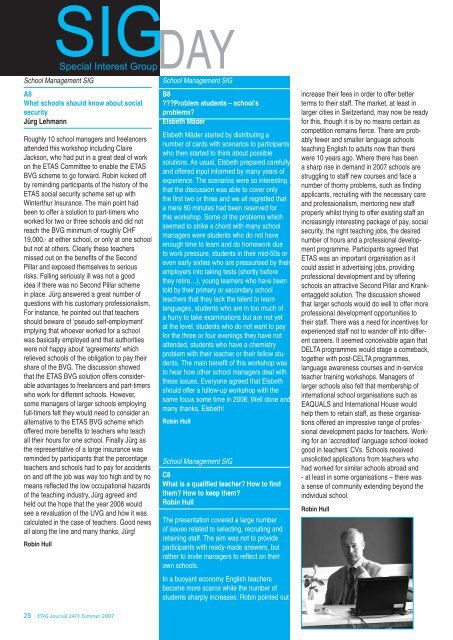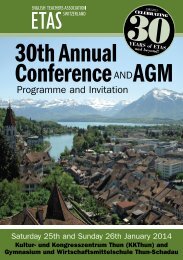The Magazine for English Professionals - English Teachers ...
The Magazine for English Professionals - English Teachers ...
The Magazine for English Professionals - English Teachers ...
You also want an ePaper? Increase the reach of your titles
YUMPU automatically turns print PDFs into web optimized ePapers that Google loves.
SIGDAY<br />
Special Interest Group<br />
School Management SIG<br />
A8<br />
What schools should know about social<br />
security<br />
Jürg Lehmann<br />
Roughly 10 school managers and freelancers<br />
attended this workshop including Claire<br />
Jackson, who had put in a great deal of work<br />
on the ETAS Committee to enable the ETAS<br />
BVG scheme to go <strong>for</strong>ward. Robin kicked off<br />
by reminding participants of the history of the<br />
ETAS social security scheme set up with<br />
Winterthur Insurance. <strong>The</strong> main point had<br />
been to offer a solution to part-timers who<br />
worked <strong>for</strong> two or three schools and did not<br />
reach the BVG minimum of roughly CHF<br />
19,000.- at either school, or only at one school<br />
but not at others. Clearly these teachers<br />
missed out on the benefits of the Second<br />
Pillar and exposed themselves to serious<br />
risks. Falling seriously ill was not a good<br />
idea if there was no Second Pillar scheme<br />
in place. Jürg answered a great number of<br />
questions with his customary professionalism.<br />
For instance, he pointed out that teachers<br />
should beware of ‘pseudo self-employment’<br />
implying that whoever worked <strong>for</strong> a school<br />
was basically employed and that authorities<br />
were not happy about ‘agreements’ which<br />
relieved schools of the obligation to pay their<br />
share of the BVG. <strong>The</strong> discussion showed<br />
that the ETAS BVG solution offers considerable<br />
advantages to freelancers and part-timers<br />
who work <strong>for</strong> different schools. However,<br />
some managers of larger schools employing<br />
full-timers felt they would need to consider an<br />
alternative to the ETAS BVG scheme which<br />
offered more benefits to teachers who teach<br />
all their hours <strong>for</strong> one school. Finally Jürg as<br />
the representative of a large insurance was<br />
reminded by participants that the percentage<br />
teachers and schools had to pay <strong>for</strong> accidents<br />
on and off the job was way too high and by no<br />
means reflected the low occupational hazards<br />
of the teaching industry. Jürg agreed and<br />
held out the hope that the year 2008 would<br />
see a revaluation of the UVG and how it was<br />
calculated in the case of teachers. Good news<br />
all along the line and many thanks, Jürg!<br />
Robin Hull<br />
28 ETAS Journal 24/3 Summer 2007<br />
School Management SIG<br />
B8<br />
???Problem students – school’s<br />
problems?<br />
Elsbeth Mäder<br />
Elsbeth Mäder started by distributing a<br />
number of cards with scenarios to participants<br />
who then started to think about possible<br />
solutions. As usual, Elsbeth prepared carefully<br />
and offered input in<strong>for</strong>med by many years of<br />
experience. <strong>The</strong> scenarios were so interesting<br />
that the discussion was able to cover only<br />
the first two or three and we all regretted that<br />
a mere 60 minutes had been reserved <strong>for</strong><br />
this workshop. Some of the problems which<br />
seemed to strike a chord with many school<br />
managers were students who do not have<br />
enough time to learn and do homework due<br />
to work pressure, students in their mid-50s or<br />
even early sixties who are pressurised by their<br />
employers into taking tests (shortly be<strong>for</strong>e<br />
they retire…), young learners who have been<br />
told by their primary or secondary school<br />
teachers that they lack the talent to learn<br />
languages, students who are in too much of<br />
a hurry to take examinations but are not yet<br />
at the level, students who do not want to pay<br />
<strong>for</strong> the three or four evenings they have not<br />
attended, students who have a chemistry<br />
problem with their teacher or their fellow students.<br />
<strong>The</strong> main benefit of this workshop was<br />
to hear how other school managers deal with<br />
these issues. Everyone agreed that Elsbeth<br />
should offer a follow-up workshop with the<br />
same focus some time in 2008. Well done and<br />
many thanks, Elsbeth!<br />
Robin Hull<br />
School Management SIG<br />
C8<br />
What is a qualified teacher? How to find<br />
them? How to keep them?<br />
Robin Hull<br />
<strong>The</strong> presentation covered a large number<br />
of issues related to selecting, recruiting and<br />
retaining staff. <strong>The</strong> aim was not to provide<br />
participants with ready-made answers, but<br />
rather to invite managers to reflect on their<br />
own schools.<br />
In a buoyant economy <strong>English</strong> teachers<br />
become more scarce while the number of<br />
students sharply increases. Robin pointed out<br />
that the time had come again <strong>for</strong> schools to<br />
increase their fees in order to offer better<br />
terms to their staff. <strong>The</strong> market, at least in<br />
larger cities in Switzerland, may now be ready<br />
<strong>for</strong> this, though it is by no means certain as<br />
competition remains fierce. <strong>The</strong>re are probably<br />
fewer and smaller language schools<br />
teaching <strong>English</strong> to adults now than there<br />
were 10 years ago. Where there has been<br />
a sharp rise in demand in 2007 schools are<br />
struggling to staff new courses and face a<br />
number of thorny problems, such as finding<br />
applicants, recruiting with the necessary care<br />
and professionalism, mentoring new staff<br />
properly whilst trying to offer existing staff an<br />
increasingly interesting package of pay, social<br />
security, the right teaching jobs, the desired<br />
number of hours and a professional development<br />
programme. Participants agreed that<br />
ETAS was an important organisation as it<br />
could assist in advertising jobs, providing<br />
professional development and by offering<br />
schools an attractive Second Pillar and Krankentaggeld<br />
solution. <strong>The</strong> discussion showed<br />
that larger schools would do well to offer more<br />
professional development opportunities to<br />
their staff. <strong>The</strong>re was a need <strong>for</strong> incentives <strong>for</strong><br />
experienced staff not to wander off into different<br />
careers. It seemed conceivable again that<br />
DELTA programmes would stage a comeback,<br />
together with post-CELTA programmes,<br />
language awareness courses and in-service<br />
teacher training workshops. Managers of<br />
larger schools also felt that membership of<br />
international school organisations such as<br />
EAQUALS and International House would<br />
help them to retain staff, as these organisations<br />
offered an impressive range of professional<br />
development packs <strong>for</strong> teachers. Working<br />
<strong>for</strong> an ‘accredited’ language school looked<br />
good in teachers’ CVs. Schools received<br />
unsolicited applications from teachers who<br />
had worked <strong>for</strong> similar schools abroad and<br />
- at least in some organisations – there was<br />
a sense of community extending beyond the<br />
individual school.<br />
Robin Hull









